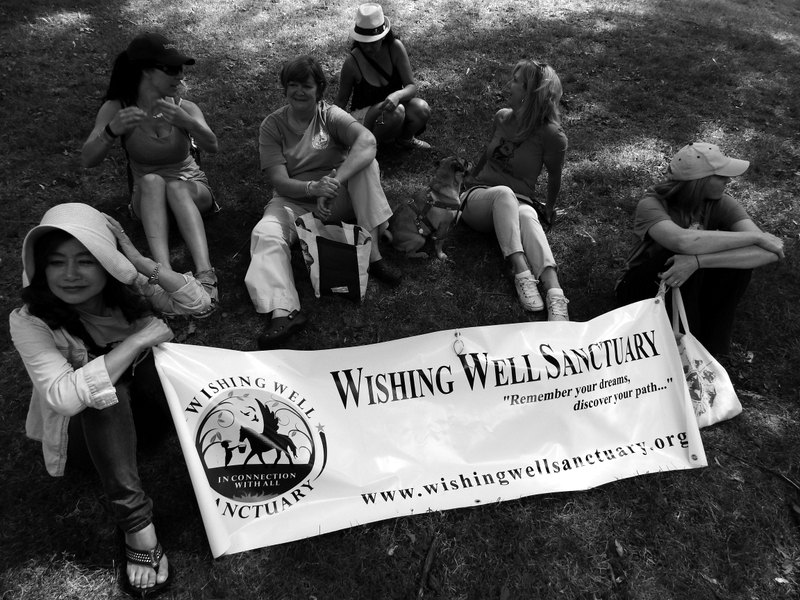It’s a place where they can live out the rest of their lives without fear of slaughter or abuse.
Some of them fell off slaughter trucks and were found in ditches. Others came from farms that could no longer take care of them and were destined to become somebody’s dinner.
“A whole lot of places where they’re going to face certain death for one reason or another,” said Sharon DiGenova, an animal rights activist and organizer of the first annual Ontario Farm Sanctuaries fundraising walk.
“Sometimes slaughter. Sometimes abandonment.”
Pigs. Sheep. Cows. Horses. Dogs and cats. Even donkeys and chickens.
But DiGenova made it clear that a sanctuary isn’t a small zoo.
“It differs in a lot of ways,” she said.
“One of them has set up an entire educational portion to their sanctuary. They have workshops, guest speakers. They do a lot of outreach and education.”
Where participants can get up close to the animals, touch and interact with them.
“The sanctuaries are homes,” she said. “Not a place where animals are on display.”
So the public can’t just show up randomly, pay a fee and walk around.
“Some of the sanctuaries do volunteer days,” said DiGenova.
“When they need extra help with repairs and upkeep. People can get right in there and work with the animals. Work for the animals. Get to know the animals really well.”
And then share a vegan lunch with their hosts.
Six sanctuaries participated in Sunday’s fundraising walk that started in Dufferin Grove Park in Toronto.
“Run by people with a big sense of compassion and a need to help,” said DiGenova.
Susan Morris is one of those people with a big heart and a deep compassion for these animals. She and her husband run Snooters Farm Animal Sanctuary, a 21-acre, privately run, privately funded, farm animal sanctuary in Ontario.
“We offer safe, forever homes to rescue animals who have come from a variety of places,” said Morris on her website.
“Some from families who grow tired of them, some from factory farms, some strays and many with disabilities. Our family includes big pigs, potbellied pigs, sheep, steers, horses, dogs, cats, hens and peafowl.”
After she purchased her first potbellied pig named Valentine, her research revealed how many pigs end up discarded by people.
“So we decided we would try to help them out,” said Morris at Saturday’s walk. “The more you do, the more you learn. And the more you want to do.”
But that takes money. And like other sanctuaries, Snooter’s relies on private donations for feed, housing, fencing and veterinarian bills.
Both she and her husband have full-time jobs. Yet they still manage to hold one open house every year.
Like Morris, Sherry Burnett and her partner operate a privately run pet sanctuary out of their own home in Kettleworth, Ontario.
They’ve been doing that for the last five years, after discovering that pigs were being “dumped in alarming numbers” as they grew bigger and heavier.
“They take them out to the country and let them loose,” said Burnett. “We’ve been on a couple of calls for stray pigs.”
By the time they’d “adopted” their sixth pig, while still living in the city, they decided it was time to purchase a farm.
So they moved to a 12-acre farm known as the Ruby Ranch Pig Sanctuary, named after their first potbellied pig called Ruby.
Burnett and her partner work full time to fund their 40-animal sanctuary which also includes sheep, hens, dogs, cats and a rooster.
“We have an open house once a year and a volunteer day because people like to come out and help,” said Robert Emigh.
Because a typical day means several hours feeding the animals, cleaning out stalls, putting out fresh hay and filling water bowls.
Robert works night shift. When he gets home he takes a nap, does chores, takes another nap in the afternoon, more chores and then goes back to work.
Although their neighbours think they’re “nuts” for what they’re doing, they’re nevertheless “very friendly and very helpful.”
On Sunday, Robert, Sherry and Susan were joined by a few dozen others on the first Annual Walk for Ontario Farm Sanctuaries.
They started in Dufferin Park and headed east across College Street, eventually ending up in Kensington Market where Pedestrian Sundays are held on the last Sunday of the month from May to October.
“Things are changing,” said Edana Brown, director, Canadian Coalition for Farm Animals. “Consumers are aware and they are driving awareness in the stores when they shop. And that change is manifested in decisions like the one we had in April.”
In April, eight of Canada’s largest grocery stores announced that by 2022 they’ll phase out sow stalls from their supply chains.
A sow stall is a 2′ x 7′ cage that about 95 per cent of Canada’s female breeding pigs are kept in for their entire lives.
“You’re making people aware that farm animals need to be treated more humanely,” said Brown. “Of course, the most humane option is not to eat them at all.”
Yet every year in Canada, 700 million land animals are raised and slaughtered for food.
“And so as long as that’s happening, we walk,” said Brown. “To make people think about their food choices. To raise money for the incredible sanctuaries.”
“And for the animals themselves. Because somebody needs to speak up on their behalf.”



